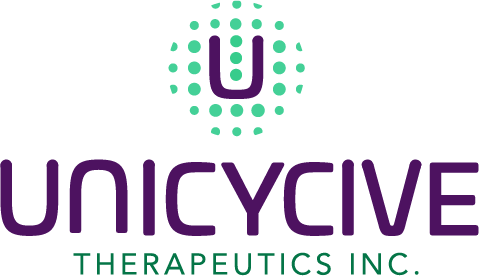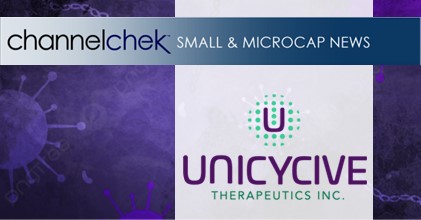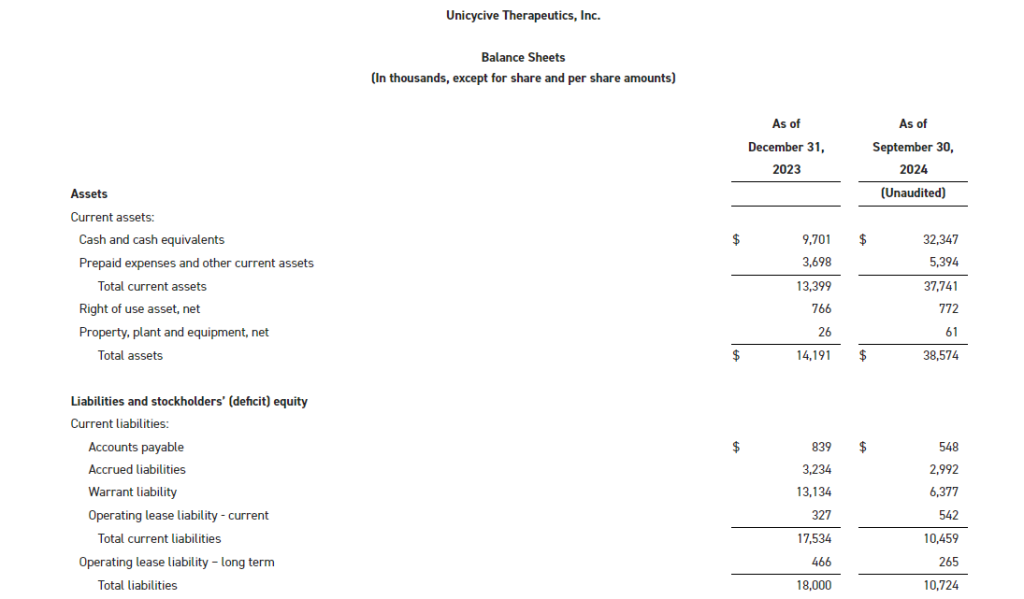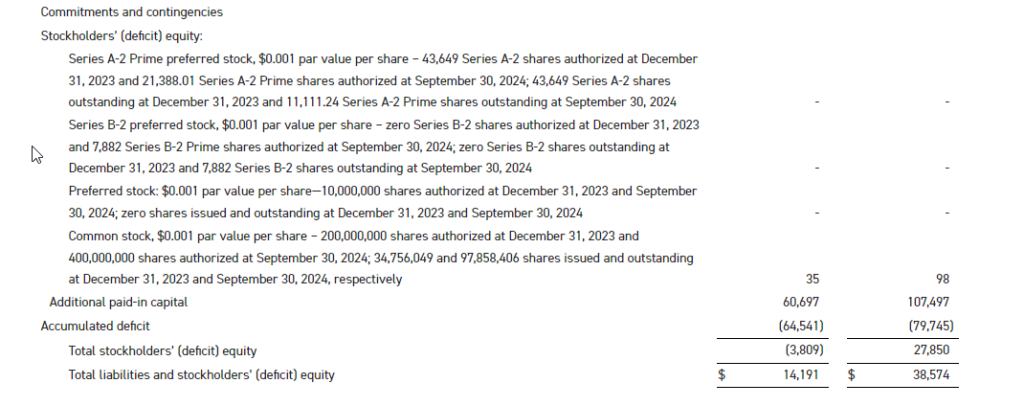
Research News and Market Data on UNCY
Large pill size, high pill burden and palatability were identified as key barriers for phosphate binder adherence
LOS ALTOS, Calif., Jan. 28, 2025 (GLOBE NEWSWIRE) — Unicycive Therapeutics, Inc. (Nasdaq: UNCY), a clinical-stage biotechnology company developing therapies for patients with kidney disease (the “Company” or “Unicycive”), today announced the publication of a review on patient perspectives regarding phosphate management in the peer-reviewed journal, Journal of Nephrological Science.
The publication, entitled “Patient Perspectives: The Effects of Contemporary Phosphorus Management on Quality of Life,” examines the challenges of phosphate management therapies from patients’ viewpoints, focusing on the limitations of current phosphate binders and their effect on patients’ quality of life. The publication underscores key findings from patient surveys and medical literature, identifying critical barriers to effective phosphorus management and emphasizing the need for patient-centered approaches to improve clinical outcomes and patient satisfaction.
“In therapeutic categories with significant patient non-adherence to standard of care like chronic kidney disease (CKD), it is essential to understand the factors disrupting medical intervention in order to offer physicians and patients innovative solutions,” said Shalabh Gupta, MD, Chief Executive Officer of Unicycive. “We believe products like Oxylanthanum Carbonate (OLC), which is characterized by small pill size, lower pill burden, and easy-to-swallow tablets, have the potential to address many of the inherent challenges in phosphorus management that often lead to nonadherence and poor serum phosphate control. If approved, we look forward to offering OLC to CKD patients on dialysis with hyperphosphatemia.”
Key Findings:
- Hyperphosphatemia is linked to increased mortality risk.
- Dialysis patients often face a high daily pill burden, with phosphate binders making up about 50% of the total.
- Nonadherence to phosphate binders is a significant challenge contributing to elevated phosphate levels. Studies show non-adherence rates range from 22% to 74%, with a mean non-adherence rate of 51%.
- Factors contributing to non-adherence include large pill size, high pill burden, and unpleasant gastrointestinal side effects. Social factors and timing complexities also impact adherence.
- Engaging patients in discussions about different phosphate binders and their unique characteristics is key to improving adherence and satisfaction. New therapies that reduce pill size or burden while maintaining efficacy could enhance clinical outcomes, quality of life, and the patient-clinician relationship.
The full publication can be accessed here.
About Oxylanthanum Carbonate (OLC)
Oxylanthanum carbonate is a next-generation lanthanum-based phosphate binding agent utilizing proprietary nanoparticle technology being developed for the treatment of hyperphosphatemia in patients with chronic kidney disease (CKD). OLC has over forty issued and granted patents globally. Its potential best-in-class profile may have meaningful patient adherence benefits over currently available treatment options as it requires a lower pill burden for patients in terms of number and size of pills per dose that are swallowed instead of chewed. Based on a survey conducted in 2022, Nephrologists stated that the greatest unmet need in the treatment of hyperphosphatemia with phosphate binders is a lower pill burden and better patient compliance.1 The global market opportunity for treating hyperphosphatemia is projected to be in excess of $2.28 billion, with the North America accounting for more than $1 billion of that total.2 Despite the availability of several FDA-cleared medications, 75 percent of U.S. dialysis patients fail to achieve the target phosphorus levels recommended by published medical guidelines.3
Unicycive is seeking FDA approval of OLC via the 505(b)(2) regulatory pathway. The NDA submission package is based on data from three clinical studies (a Phase 1 study in healthy volunteers, a bioequivalence study in healthy volunteers, and a tolerability study of OLC in CKD patients on dialysis), multiple preclinical studies, and the chemistry, manufacturing and controls (CMC) data. OLC is protected by a strong global patent portfolio including issued patents on composition of matter with exclusivity until 2031, and with the potential for patent term extension until 2035.
About Hyperphosphatemia
Hyperphosphatemia is a serious medical condition that occurs in nearly all patients with End Stage Renal Disease (ESRD). If left untreated, hyperphosphatemia leads to secondary hyperparathyroidism (SHPT), which then results in renal osteodystrophy (a condition similar to osteoporosis and associated with significant bone disease, fractures and bone pain); cardiovascular disease with associated hardening of arteries and atherosclerosis (due to deposition of excess calcium-phosphorus complexes in soft tissue). Importantly, hyperphosphatemia is independently associated with increased mortality for patients with chronic kidney disease on dialysis. Based on available clinical data to date, over 80% of patients show signs of cardiovascular calcification by the time they become dependent on dialysis.4
Dialysis patients are already at an increased risk for cardiovascular disease (because of underlying diseases such as diabetes and hypertension), and hyperphosphatemia further exacerbates this. Treatment of hyperphosphatemia is aimed at lowering serum phosphate levels via two means: (1) restricting dietary phosphorus intake; and (2) using, on a daily basis, and with each meal, oral phosphate binding drugs that facilitate fecal elimination of dietary phosphate rather than its absorption from the gastrointestinal tract into the bloodstream.
About Unicycive Therapeutics
Unicycive Therapeutics is a biotechnology company developing novel treatments for kidney diseases. Unicycive’s lead drug candidate, oxylanthanum carbonate (OLC), is a novel investigational phosphate binding agent being developed for the treatment of hyperphosphatemia in chronic kidney disease patients on dialysis. Positive pivotal trial results were reported in June 2024 for OLC, and a New Drug Application (NDA) is under review by the U.S. Food and Drug Administration (FDA) with a Prescription Drug User Fee Act (PDUFA) Target Action Date of June 28, 2025. OLC is protected by a strong global patent portfolio including an issued patent on composition of matter with exclusivity until 2031, and with the potential patent term extension until 2035 after OLC approval. Unicycive’s second asset, UNI-494, is a patent-protected new chemical entity in clinical development for the treatment of conditions related to acute kidney injury. UNI-494 has successfully completed a Phase 1 trial. For more information, please visit Unicycive.com and follow us on LinkedIn, X, and YouTube.
Forward-looking statements
Certain statements in this press release are forward-looking within the meaning of the Private Securities Litigation Reform Act of 1995. These statements may be identified using words such as “anticipate,” “believe,” “forecast,” “estimated” and “intend” or other similar terms or expressions that concern Unicycive’s expectations, strategy, plans or intentions. These forward-looking statements are based on Unicycive’s current expectations and actual results could differ materially. There are several factors that could cause actual events to differ materially from those indicated by such forward-looking statements. These factors include, but are not limited to, clinical trials involve a lengthy and expensive process with an uncertain outcome, and results of earlier studies and trials may not be predictive of future trial results; our clinical trials may be suspended or discontinued due to unexpected side effects or other safety risks that could preclude approval of our product candidates; risks related to business interruptions, which could seriously harm our financial condition and increase our costs and expenses; dependence on key personnel; substantial competition; uncertainties of patent protection and litigation; dependence upon third parties; and risks related to failure to obtain FDA clearances or approvals and noncompliance with FDA regulations. Actual results may differ materially from those indicated by such forward-looking statements as a result of various important factors, including: the uncertainties related to market conditions and other factors described more fully in the section entitled ‘Risk Factors’ in Unicycive’s Annual Report on Form 10-K for the year ended December 31, 2023, and other periodic reports filed with the Securities and Exchange Commission. Any forward-looking statements contained in this press release speak only as of the date hereof, and Unicycive specifically disclaims any obligation to update any forward-looking statement, whether as a result of new information, future events or otherwise.
1Reason Research, LLC 2022 survey. Results here.
2 Fortune Business Insights™, Hyperphosphatemia Treatment Market, 2023-2030
3 US-DOPPS Practice Monitor, May 2021; http://www.dopps.org/DPM
4 Block GA, Klassen PS, Lazarus JM, Ofsthun N, Lowrie EG, Chertow GM. Mineral metabolism, mortality, and morbidity in maintenance hemodialysis. J Am Soc Nephrol. 2004 Aug;15(8):2208-18. doi: 10.1097/01.ASN.0000133041.27682.A2. PMID: 15284307.
Investor Contacts:
Kevin Gardner
LifeSci Advisors
kgardner@lifesciadvisors.com
Chris Calabrese
LifeSci Advisors
ccalabrese@lifesciadvisors.com
SOURCE: Unicycive Therapeutics, Inc.

Source:
Released January 28, 2025





